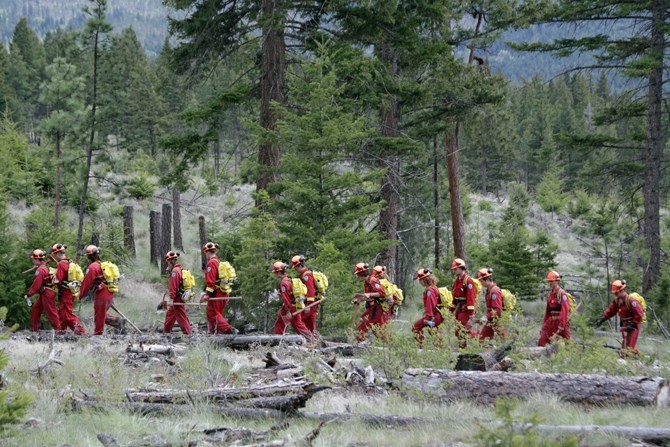
New recruits training with the B.C. Wildfire Service.
Image Credit: FILE PHOTO
October 19, 2016 - 1:00 PM
SALMON ARM - Cutbacks at the Rapattack base in Salmon Arm are driving up concerns about the future of wildfire protection services in the community.
The provincial government recently announced it is phasing out catering and accommodation services for crews stationed at the base.
Rapattack is a specially trained group within the B.C. Wildfire Service that is called upon to fight fires in difficult to access areas by rappelling to the site from helicopters. Salmon Arm is home to the only Rapattack base in B.C.
In response to a request for an interview, the Ministry of Forests sent a written statement saying the decision came as part of a review to “ensure best use of taxpayers’ dollars” and due to Salmon Arm “no longer being a remote location.”
Catering services will be phased out in January 2017, and accommodation services in January 2018. Food and housing at the barracks has been provided to firefighters stationed at the base since the late 1970s.
The estimated cost savings from discontinuing catering and accommodation is $119,000 a year.
The move has left the City of Salmon Arm concerned about the long term future of the base if the 30 affected staff are unable to secure housing.
“With the availability of housing in this area already low, the reality is that citizens may be left without the fire protection services provided by these highly trained professionals if the barracks are closed and/or moved,” the city says in a media release.
In response to the decision, Mayor Nancy Cooper has requested that Salmon Arm Rapattack staff be permitted to continue residing in the barracks after January 2018 and be charged market value for the accommodations.
According to information from the B.C. Wildfire Service, most firefighters are responsible for finding their own accommodations, however in a few locations, including Salmon Arm, housing has been provided at no fee or a nominal cost.
“We are not asking for the Ministry to subsidize housing for their staff, just to ensure that these workers have accommodation for the months of May to October, a time when the vacancy rate in our area is at its lowest and our need for these services is at its highest,” Cooper says.
To contact a reporter for this story, email Charlotte Helston or call 250-309-5230 or email the editor. You can also submit photos, videos or news tips to the newsroom and be entered to win a monthly prize draw.
We welcome your comments and opinions on our stories but play nice. We won't censor or delete comments unless they contain off-topic statements or links, unnecessary vulgarity, false facts, spam or obviously fake profiles. If you have any concerns about what you see in comments, email the editor in the link above.
News from © iNFOnews, 2016